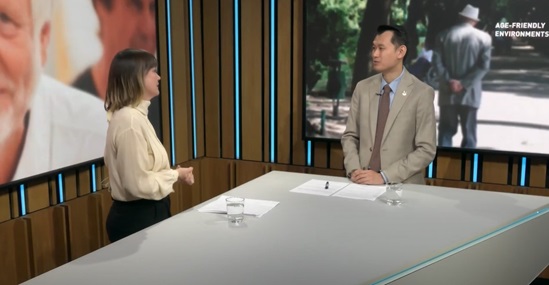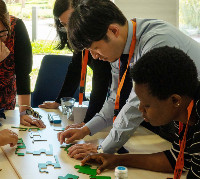Ageing
Healthy ageing is defined as developing and maintaining the functional ability that enables well-being in later years. Functional ability is influenced by the intrinsic capacity of an individual's physical and mental capacities, the environments in which people live–spanning physical, social, health and care, as well as policy dimensions—and the dynamic interaction between these elements.
In the context of the WHO European Region’s extended longevity, acknowledging the diverse capacities and life experiences of older adults, while addressing persistent inequities and advancing equity, tied to socioeconomic status, gender, ethnicity, disability, and other social determinants of health, are paramount to foster healthy ageing. Population ageing brings both challenges and opportunities, demanding enhanced health care, a skilled health and care workforce, age-friendly environments, stronger intergenerational solidarity, and efforts to combat ageism and promote equity across all of society.
Investing in these initiatives unlocks the manifold contributions of older individuals – whether within families; local communities, as volunteers or in other roles; or society at large. Crucially, this should be coupled with ensuring health systems are equipped to meet the needs of rapidly ageing populations, especially in primary care settings encompassing preventive, curative, rehabilitative, assistive, and palliative care, alongside sustainable long-term care, while also adopting a life-course perspective to support healthier future generations of older people.
The population aged 60 and older in the WHO European Region is rapidly growing – from 215 million in 2021 to a projected 247 million by 2030, and over 300 million by 2050. The number of people aged 80 and over – those most likely to need support – is expected to more than double by 2050, placing additional demands on health and care systems.
This demographic shift has far-reaching implications for health-care delivery, workforce planning, housing, urban design, transport and long-term care. Creating age-friendly, inclusive environments and strengthening primary, community-based and long-term care will be essential to ensure that everyone, at all stages of life, can age with dignity, maintain independence and contribute meaningfully to society.
This also calls for investing in prevention and early interventions to build and maintain intrinsic capacity, delay functional decline and reduce the burden of disease, while actively challenging ageism to promote inclusion, equity and intergenerational solidarity.
Throughout the WHO European Region, more people are living longer than ever before. However, these added years do not always equate to good health. Healthy ageing means enhancing both longevity and well-being. To achieve this, collaboration is key among governments, international bodies, civil society, researchers, businesses, and media to support well-being, equity, and inclusion, no matter where we live.
This also means challenging ageism, fostering intergenerational solidarity, and ensuring that people of all ages are valued, respected, and supported. By taking a life course perspective, we can promote healthier futures for today’s and tomorrow’s older persons.
WHO Europe collaborates with countries, UN agencies, and various stakeholders to promote healthy ageing and recognize the contributions of older individuals, who benefit communities across the Region with their wisdom and experience.
Aligned with the UN Decade of Healthy Ageing, WHO/Europe follows 6 action areas:
- prioritizing preventive measures for physical, social, and mental well-being while ensuring the availability of support and services throughout life;
- creating enabling environments, including age-friendly cities and communities, to empower older individuals in community engagement;
- ensuring accessible, affordable, and high-quality long-term care and support for older people, their caregivers and families, within an integrated continuum of care;
- effectively implementing policies to leverage the potential of older persons; and
- challenging ageism and shifting narratives to ensure older people are seen, heard, and valued as active members of society
- enhancing data collection and research to strengthen equitable policies and programmes aimed at promoting healthy ageing.












